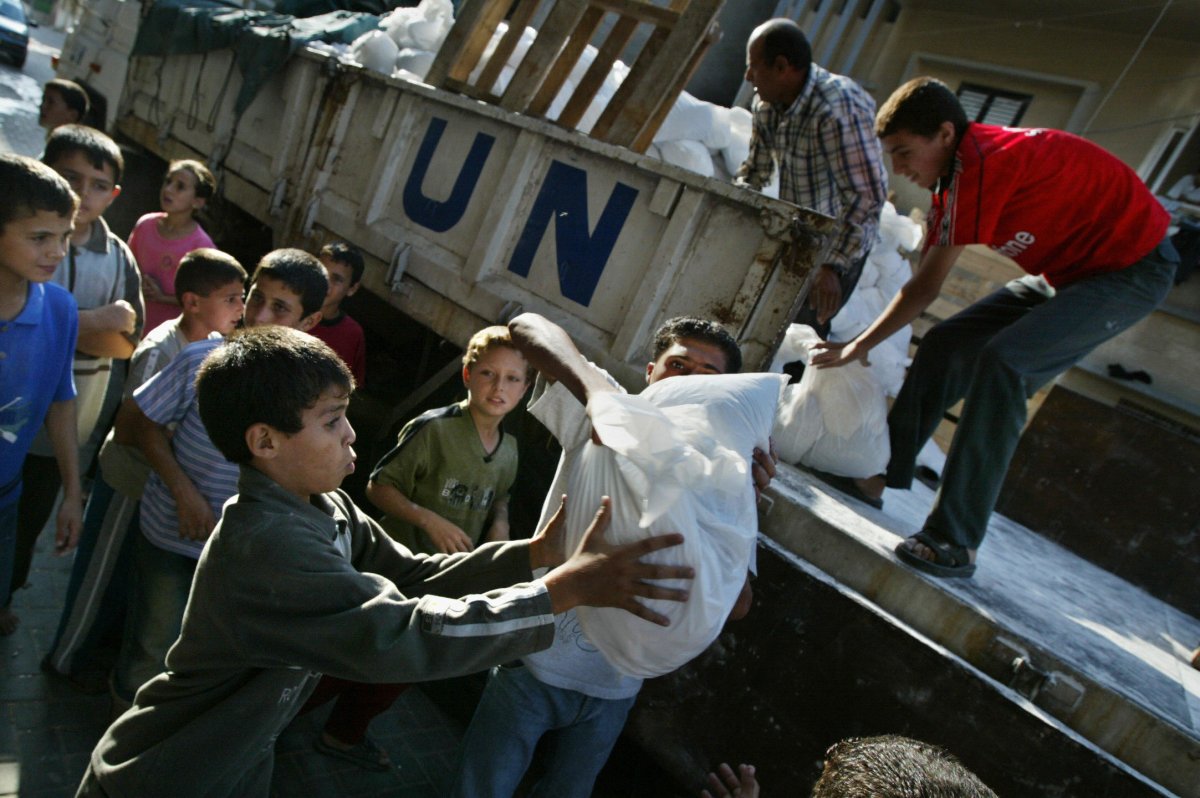The U.S. would be willing to reconsider its funding cutoff of aid to Palestinian refugees in the wake of the coronavirus pandemic, United States Agency for International Development (USAID) officials suggested on Thursday.
Asked during a press briefing on U.S. foreign assistance in response to the COVID-19 outbreak whether the U.S. would reconsider its aid cutoff to the United Nations Relief and Works Agency (UNRWA) in the wake of the pandemic, James Richardson, director of U.S. Foreign Assistance Resources, said it was a possibility.
"I would say that it's important for countries to come forward if they have needs," he said. "I think this is what we saw particularly in China where the need was not apparent right away. So...transparency is hugely important."
"So we would just encourage every government around the world, including the Palestinian Authority, to come forward with a request of assistance, and we will take that under consideration," Richardson said.
Hours later, a State Department official sought to make clear, however, that there had been no discussion of resuming U.S. contributions to UNRWA.
They also said there had been no new developments or decisions made regarding the provision of U.S. assistance in the West Bank and Gaza.
Every government and governing authority around the world, they said, is, however, welcome to identify needs with which the U.S. might be able to assist with. Those requests will be taken into consideration as they are made.
A separate White House official also stressed to Newsweek that the Trump administration's policy on funding for UNRWA and the Palestinian authority had not changed.
While Richardson suggested the U.S. would be open to considering requests for funding to assist Palestinians amid the pandemic, USAID Deputy Administrator Bonnie Glick was quick to point out that the U.S. is "not the only donor in the world focusing on the COVID-19 outbreak."
"One other short thing to add to that is we noted that the Government of Qatar has generously offered assistance to the Palestinians," Glick said. "So, recognizing that the United States is not the only donor in the world focusing on the COVID-19 outbreak, we're grateful that other nations are rising to the task as well."
Indeed, Qatar has dedicated $150 million in humanitarian aid to the Gaza Strip, with the money to include financial aid specifically earmarked to help address the spread of the coronavirus.
The money is expected to be sent to Gaza over the course of six months and will include funding for United Nations humanitarian programming, according to the Qatar News Agency.
Already, a number of coronavirus cases have been reported in the Gaza Strip, prompting concerns that the outbreak could bring the humanitarian situation in the self-governing Palestinian territory to a crisis point.
This week, Amnesty International UK warned that the coronavirus pandemic could cause a "humanitarian catastrophe in Gaza" if urgent action is not taken, "or, to be more accurate," the organization has said: "there could be an intensification of an existing humanitarian emergency."
"The Gaza Strip is already on the brink of collapse as a consequence of a 13-year-long Israeli blockade of the territory. The blockade, which has meant the imprisonment and collective punishment of an entire civilian population, has brought the health system to its knees," Amnesty International UK said.
As it stands, hospitals and clinics in the territory are already struggling to run efficiently, with health providers being often being forced to get by with just four to six hours of access to electricity a day, Amnesty International UK said.
"Ominously, given what we know about the spread of coronavirus, Gaza is also one of the most densely populated places on earth. Families live in crowded and often unsanitary housing, much of which is not connected to a sewage system and has no access to safe water," Amnesty International UK warned. "Gazans, although disproportionately young, are nevertheless vulnerable to illness due to weakened immune systems and malnutrition."
With the COVID-19 outbreak having already reached the Gaza Strip, the organization said, the pandemic could soon spell disaster for the territory.

"On Wednesday the 25th of March, the Palestinian authorities announced the first coronavirus death in the occupied Palestinian territory, only two days after the first reports of the virus in Gaza," the organization said.
"Some of the world's richest countries are struggling to contain the pandemic," Amnesty International UK said. "How on earth can overstretched, under-resourced medics begin to cope in blockaded Gaza?"
The organization has called on Israel to help combat the spread of COVID-19 in the territory, asserting that the Israeli government has a "legal duty" to do so.
The Trump administration had announced in August 2018 that it would be cutting U.S. funding for UNRWA, with the State Department asserting that the U.S. could not "shoulder the very disproportionate share of the burden" of the costs to keep the agency running.
Before that the decision, the U.S. had been the largest individual donor to the United Nations agency.
The government's funding rollback was met with widespread criticism, with many warning that it would cause further instability for the hundreds of thousands of Palestinian refugees living there.
While the USAID officials have suggested the U.S. would consider requests for funding in the wake of the COVID-19 outbreak, it is unclear whether such requests would actually be approved.
This article has been updated with a response from the White House and from a State Department official. Newsweek has also contacted the Israeli government and Amnesty International UK for comment.
Uncommon Knowledge
Newsweek is committed to challenging conventional wisdom and finding connections in the search for common ground.
Newsweek is committed to challenging conventional wisdom and finding connections in the search for common ground.
About the writer
Chantal Da Silva is Chief Correspondent at Newsweek, with a focus on immigration and human rights. She is a Canadian-British journalist whose work ... Read more
To read how Newsweek uses AI as a newsroom tool, Click here.








